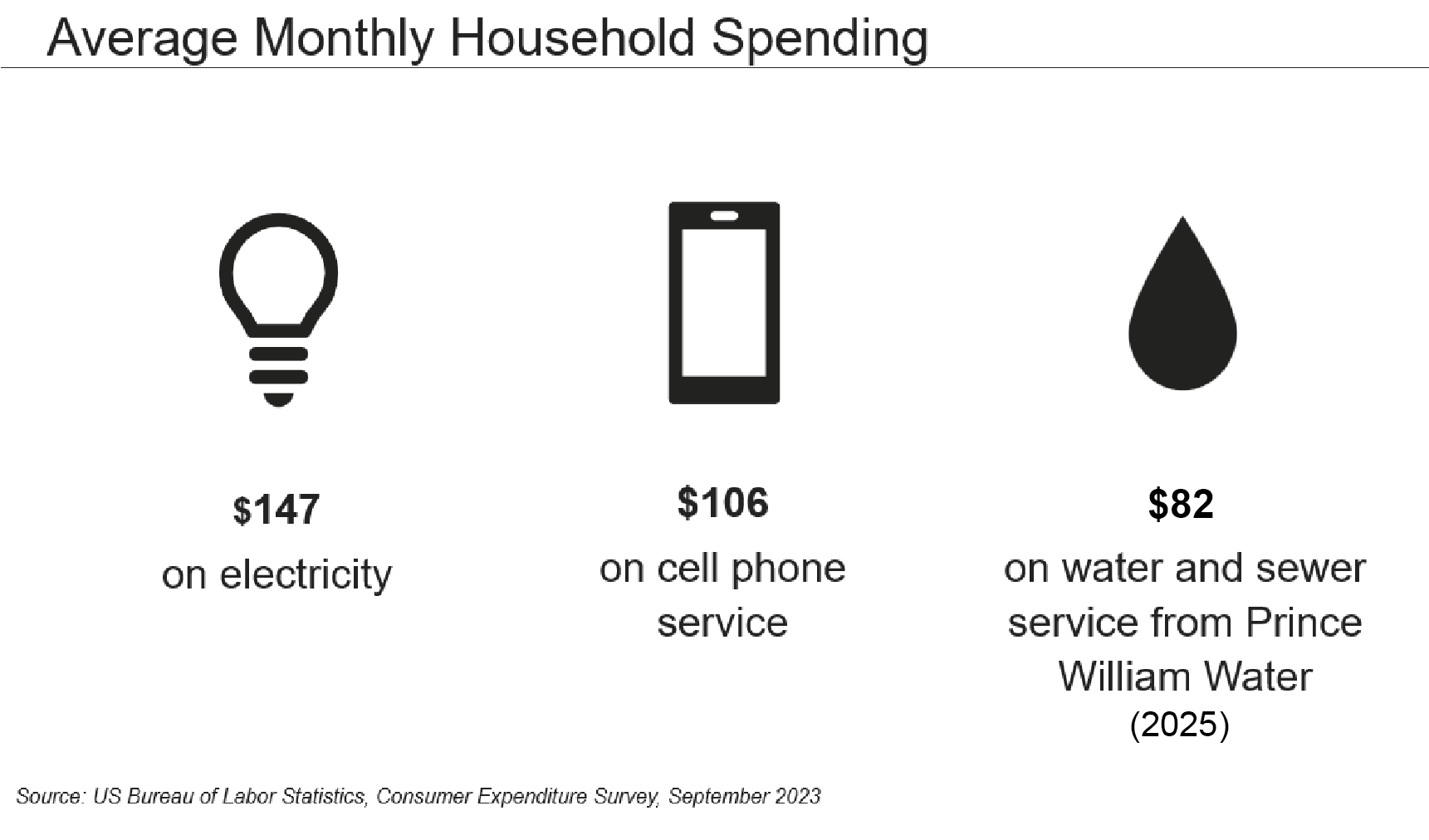Water Rates
What are other local jurisdictions charging for water and sewer service?
In comparison with other local jurisdictions, Prince William Water’s rates remain competitive.
| Local Jurisdiction | Estimated Water and Sewer Bill* |
| Fauquier County | 153.02 |
| VA American/Dale Service | 110.56 |
| City of Manassas Park | 110.22 |
| Stafford County | 100.58 |
| City of Manassas | 97.14 |
| Virginia Average (Draper Aden Survey) | 94.44 |
| Fairfax County (effective April 1, 2026) | 91.79 |
| Fairfax County (until April 1, 2026) | 89.86 |
| Prince William Water | 88.85 |
| Falls Church | 83.42 |
| Loudoun County | 80.43 |
| *Bill estimated based on 5,000 gallons per month for a single-family residential home as of January 2026. | |
How does Prince William Water’s average monthly bill compare to other utility services?

What were some of the drivers behind the rate and fee changes for 2025-2027?
Prince William Water’s goal is to set fair and equitable rates and fees while providing clean, safe, reliable drinking water to our customers and to protect the environment. This means ensuring that Prince William Water’s infrastructure is well-maintained and in good working condition, which requires a significant capital investment every year. The adopted rates for 2025-2027 are primarily driven by capital replacement needs, the rising cost of construction, as well as increases in purchased drinking water, purchased water reclamation services and other operating costs.
Prince William Water purchases most of its drinking water from advanced treatment plants owned and operated by Fairfax Water. Wholesale water rates charged by Fairfax Water have increased significantly over the past few years. Prince William Water also purchases water reclamation services from the Upper Occoquan Service Authority (UOSA) to serve a portion of our customers. Recently, UOSA treatment costs have also increased considerably.
In addition, the updated rates and fees are also required to properly maintain our infrastructure, meet or exceed environmental regulations, and continue delivering the high-quality, reliable service our customers expect from Prince William Water.
What are the water and sewer rates and fees for residential and commercial customers starting January 1, 2025?
At its November 14th, 2024 meeting, the Board approved the rates included in this Public Notice, which details all rates and fees starting January 1, 2025. For additional questions, please contact Customer Service at (703) 335-7950 or customerservice@pwwater.org.
How can I reduce my water bill?
Review your water bill monthly so you are familiar with how much water your household uses throughout the year. Visit our Wise Water Use Tips page to learn about wise water use like checking for leaks and addressing them in a timely manner, monitoring outdoor water use, and other suggestions that might apply to your household. In addition, you can visit our Financial Assistance webpage for more information about financial assistance for your water bill.
What is the typical residential bill?
A typical residential customer uses 5,000 gallons of water monthly, which results in the following monthly water and sewer bills for the years 2025, 2026 and 2027. The new rates take effect on January 1 of each year.
| Average Residential Monthly Bill (based on a 3/4" meter, five thousand gallons per month) | ||||
| 2025 | 2026 | 2027 | ||
| Monthly Water and Sewer Bill | $81.55 | $88.85 | $96.05 | |
Why has Prince William Water established a new customer class for industrial use?
Prince William Water has identified a group of commercial water customers whose usage patterns vary significantly from the overall commercial customer class. This group of customers is comprised of large (at least 50 Equivalent Residential Units ERUs) industrial water users. The majority of these customers are using water for cooling and typically have a separate sewer meter.
The volume of water used by industrial customers varies significantly from month to month and is usually seasonal. The annual average daily usage per ERU for industrial customers is lower than residential and commercial customers; however, the maximum daily water demand is much higher than that of residential and commercial customers. This is important because Prince William Water purchases water capacity and designs its water system based on daily demand.
Because this customer group has different usage patterns and impacts on the system, Prince William Water created an industrial customer class. Since Prince William Water purchases water capacity and designs its water system based on maximum daily demand, Prince William Water is also basing ERU calculations on maximum daily demand for industrial customers.
What does Prince William Water charge for availability fees?
Prince William Water sets availability fees to recover the cost of expanding water and sewer systems required to serve new customers, together with the cost of development administration.
The availability fees for the next three calendar years are:
| | 2025 | 2026 | 2027 |
| Water Availability Fee | $5,300 | $5,800 | $6,300 |
| | | | |
| Sewer Availability Fee | $12,000 | $12,400 | $12,800 |
| TOTAL Water and Sewer | $17,300 | $18,200 | $19,100 |
What is considered an affordable water and sewer bill?
Prince William Water’s average monthly bill is considered affordable or low burden using several affordability metrics.
The Environmental Protection Agency (EPA) recommends multiple affordability measures and guidelines for water and sewer service. The guidance originally developed by the EPA in relation to median household income states that customers’ bills under 4.0% of median household income are considered affordable.
To expand upon the view of affordability for households with lower incomes, several additional metrics have been developed over the years, including Lowest Quintile Residential Indicator and the Hours Worked metrics.
- The Lowest Quintile Residential Indicator approach evaluates a customer bill at the lowest quintile of income instead of median income, with a threshold of under 4% considered affordable.
- The Hours Worked approach evaluates the number of hours worked at the prevailing minimum wage to pay the typical residential water and sewer bill, with the threshold of under 8 hours worked deemed affordable.
Based on Prince William Water’s typical household consumption of 5,000 gallons per month, Prince William Water’s proposed monthly water and sewer bills for fiscal years 2025 through 2027 are less than 1% of median household income, under 2% for Lowest Quintile Residential Indicator and under 7.0 hours worked at minimum wage.
The rates that take effect in 2025, 2026 and 2027 continue to reflect Prince William Water’s average monthly bill as affordable and continue to place Prince William Water’s average bill among the lowest in the region.
Why do rates vary by jurisdiction?
Each water and sewer utility sets its rates based on its own priorities, operating environment, and capital needs. Decisions about the timing of maintenance and infrastructure replacement are based on the utility’s unique system needs, customer requirements, regulatory requirements, and available resources.
Prince William Water is careful to ensure its rates are competitive with surrounding jurisdictions while making the investments necessary to provide clean and safe drinking water to its customers and protecting the environment. Through these efforts, Prince William Water’s rates remain among the lowest in the region.
Can rate adjustments be deferred?
Prince William Water deferred rate adjustments during the Coronavirus 19 Pandemic. Further deferring necessary rate adjustments could require Prince William Water to postpone necessary infrastructure replacement projects. Additionally, keeping rates artificially low results in higher rate increases in the future when Prince William Water would be required to catch up with deferred infrastructure replacements.
Why does Prince William Water set rates for three years at a time?
Setting rates three years at a time minimizes rate shock to customers and allows for strategic financial decision making.
Does Prince William Water receive tax money from Prince William County?
No, Prince William Water does not receive any tax dollars from Prince William County Government. Prince William Water is funded solely by User Rates and Fees and Developer Rates and Fees.
Why are periodic rate increases necessary?
Prince William Water’s goal is to set fair and equitable rates and fees while providing clean, safe drinking water to its customers and protecting the environment. A key element of providing clean drinking water and protecting the environment is ensuring that Prince William Water’s infrastructure is maintained and in good working condition. This requires a significant capital investment every year. The most recent factors impacting rate increases are capital replacement needs; the rising cost of construction; and increases in purchased water, purchased water reclamation services and other operating costs.
Prince William Water purchases most of its drinking water from advanced water treatment plants owned and operated by Fairfax Water. Wholesale water rates charged by Fairfax Water have increased significantly over the past few years.
Wastewater in western areas of Prince William County is treated at the Upper Occoquan Service Authority (UOSA) Water Reclamation Plant, and wastewater in the eastern areas of Prince William County is treated at the H.L. Mooney Advanced Water Reclamation Facility. Both facilities are among the most advanced water reclamation facilities in the country. Recently, wastewater treatment costs at both treatment plants have also increased considerably.
In addition, Prince William Water sets rates so that we can properly maintain our infrastructure, meet or exceed environmental regulations, and continue delivering the quality and reliability our customers expect from us.

